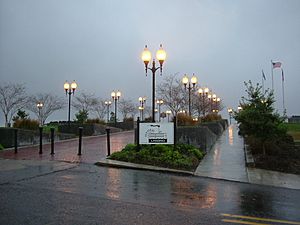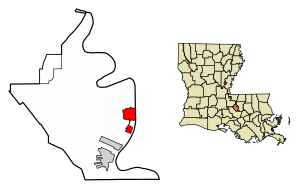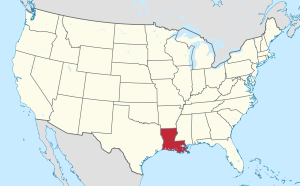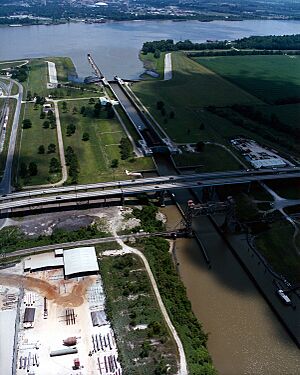Port Allen, Louisiana facts for kids
Quick facts for kids
Port Allen
|
|
|---|---|
| City of Port Allen | |

The Old Ferry Landing at Port Allen
|
|

Location of Port Allen in West Baton Rouge Parish, Louisiana.
|
|

Location of Louisiana in the United States
|
|
| Country | United States |
| State | Louisiana |
| Parish | West Baton Rouge |
| Incorporated | 1916 |
| Named for | Henry Watkins Allen |
| Area | |
| • Total | 3.33 sq mi (8.62 km2) |
| • Land | 2.83 sq mi (7.34 km2) |
| • Water | 0.49 sq mi (1.28 km2) |
| Elevation | 26 ft (8 m) |
| Population
(2020)
|
|
| • Total | 4,939 |
| • Density | 1,742.15/sq mi (672.66/km2) |
| Time zone | UTC-6 (CST) |
| • Summer (DST) | UTC-5 (CDT) |
| ZIP Code |
70767
|
| Area code(s) | 225 |
| FIPS code | 22-61790 |
| Website | www.portallen.org |
Port Allen is a city in West Baton Rouge Parish, Louisiana, United States. It is also the main town, or parish seat, of West Baton Rouge Parish. The city is located on the west side of the Mississippi River. Major highways like Interstate 10 and US Highway 190 pass nearby. In 2020, about 4,939 people lived there. Port Allen is part of the larger Baton Rouge metropolitan area.
Port Allen is known for its Mississippi Riverfront Development, which offers great views of the river and Baton Rouge. You can also visit the West Baton Rouge Museum, the City of Port Allen Railroad Depot, Scott's Cemetery, the Port of Greater Baton Rouge, and the Port Allen Lock.
Contents
History of Port Allen
Early Settlements
Before Port Allen was officially founded, there was a village called La Ville De St. Michel (or San Miguel) from 1790 to 1817. Later, around the 1850s, a new community grew in the same area. It was known as the Town of West Baton Rouge.
How Port Allen Got Its Name
The city of Port Allen was officially founded in 1878. It was named after Henry Watkins Allen. He was a member of the American Confederate States Army and the 17th Governor of Louisiana. Before the city was founded, Allen owned a large sugar plantation called Allendale Plantation, which he started in 1855. He also built his own railroad that ran through the village, helping it grow.
The Story of Sunrise
Around the same time Port Allen was founded, a small community called Sunrise was created just north of it by a former slave named Alex Banes. Many people from Sunrise worked at the Anchorage Depot railroad. When the depot moved around 1900, many residents followed. In 1918, a big fire destroyed much of Sunrise. After the fire, the area became part of Port Allen.
Growing into a City
Port Allen officially became an incorporated city in 1916. A very important event happened on August 10, 1940. The Huey P. Long Bridge opened, connecting the east and west sides of the Mississippi River. This bridge helped the city's businesses and industries grow a lot. Over time, Port Allen changed from mostly farming to having more factories and manufacturing plants. By the 1950s, many new plants were built. In 1963, the town's population reached 5,000, and it was officially renamed a "city." For many years, the city had separate areas for different groups of people.
Geography
Port Allen is located at 30°27′13″N 91°12′36″W / 30.45361°N 91.21000°W.
The city covers about 2.6 square miles (6.8 square kilometers). Most of this area, about 2.1 square miles (5.5 square kilometers), is land. The rest, about 0.5 square miles (1.3 square kilometers), is water. The mighty Mississippi River flows right next to the city on its east side.
Population Information
| Historical population | |||
|---|---|---|---|
| Census | Pop. | %± | |
| 1920 | 920 | — | |
| 1930 | 1,524 | 65.7% | |
| 1940 | 1,898 | 24.5% | |
| 1950 | 3,097 | 63.2% | |
| 1960 | 5,026 | 62.3% | |
| 1970 | 5,728 | 14.0% | |
| 1980 | 6,114 | 6.7% | |
| 1990 | 6,277 | 2.7% | |
| 2000 | 5,278 | −15.9% | |
| 2010 | 5,180 | −1.9% | |
| 2020 | 4,939 | −4.7% | |
| U.S. Decennial Census 2011 estimate |
|||
| Group | Number of People | Percentage |
|---|---|---|
| White (not Hispanic) | 1,660 | 33.61% |
| Black or African American (not Hispanic) | 2,952 | 59.77% |
| Native American | 17 | 0.34% |
| Asian | 20 | 0.4% |
| Pacific Islander | 1 | 0.02% |
| Other/Mixed | 147 | 2.98% |
| Hispanic or Latino | 152 | 2.88% |
In 2020, the census showed that 4,939 people lived in Port Allen. There were 2,097 households and 1,343 families.
Back in 2000, there were 5,278 people living in the city. About 30.5% of households had children under 18. Around 39.7% were married couples living together. The average household had 2.56 people. The average family had 3.09 people.
The population was spread out by age. About 25.5% were under 18 years old. Around 15.1% were 65 years or older. The average age in the city was 37 years.
Education
The West Baton Rouge Parish School Board manages the public schools in the area.
Holy Family School is a private Catholic school. It teaches students from pre-kindergarten up to eighth grade. It first opened in 1949.
Port Allen is also near Baton Rouge Community College, which offers higher education.
Fun Places to Visit
- West Baton Rouge Museum: This museum is more than just one building! It includes the main museum, an old house from the 1830s called the Aillet House, and cabins from the 1870s and 1890s. There's also an old store from the 1880s and a farmhouse from the 1930s. You can even see a recreated barn from the early 1900s.
- City of Port Allen Railroad Depot: This museum shows what life was like for railroad workers in the 1940s. You can see a ticket booth, old clothes, and even the original typewriter used at the depot. There's also a 1950 caboose that you can tour. It's the only one in Louisiana that's almost completely restored!
- Mississippi Riverfront Development: This area gives you amazing views of the mighty Mississippi River and the city of Baton Rouge. It has a nice walking path with special paving, benches for relaxing, and pretty lights. From 1820 to 1968, a ferry used to cross the river here, connecting Port Allen and Baton Rouge.
- Scott's Cemetery: This is a historic burial ground for African Americans in West Baton Rouge. It dates back to the 1850s, during the time of slavery. It's located near the Riverfront Development.
- Port of Greater Baton Rouge: Located in Port Allen, this is a very important port on the Mississippi River. It's where large ships and barges can travel. It helps with international trade, handling all kinds of goods like grain, paper, chemicals, and oil. It's one of the top ten ports in the entire country! It moves about 61 million tons of cargo each year.
- Port Allen Lock: This amazing structure connects the Mississippi River to the Gulf Intracoastal Waterway. It makes the journey to the Gulf of Mexico about 120 miles (193 kilometers) shorter! The Lock is the biggest of its kind. It has huge 90-ton doors and was built in 1961. It helps ships move between the river and the waterway, which is an inland shortcut connecting Florida and Texas.
Festivals
Port Allen hosts several fun festivals throughout the year. Some of these include:
- The Lagniappe Dulcimer Fete Festival
- Port Allen Bonfires on the Mississippi River
- SugarFest
- West Baton Rouge Parish Fair
- Kite Fest Louisiane
- Oldies but Goodies Fest
Historic Places
Several places in Port Allen are listed on the National Register of Historic Places. This means they are important historical sites. Some of these include:
- The Aillet House
- The Allendale Plantation Historic District
- Monte Vista Plantation House
- Poplar Grove Plantation House
- Port Allen Middle School
- Sandbar Plantation House
- The Smithfield Plantation House
Notable People
- Henry Watkins Allen: He was a planter and the 17th Governor of Louisiana. The city of Port Allen is named in his honor.
- Tracy Porter: A former professional football player who played as a cornerback for teams like the Chicago Bears and the New Orleans Saints. After the Saints won the Super Bowl in 2009, Port Allen jokingly renamed itself "Porter Allen" for a day to celebrate him!
- Arthur T. Prescott: An educator who was the first president of Louisiana Tech University. He taught school in Port Allen from 1883 to 1884.
- James “Slim Harpo” Moore: A famous blues music artist.
See also
 In Spanish: Port Allen (Luisiana) para niños
In Spanish: Port Allen (Luisiana) para niños
 | Dorothy Vaughan |
 | Charles Henry Turner |
 | Hildrus Poindexter |
 | Henry Cecil McBay |


